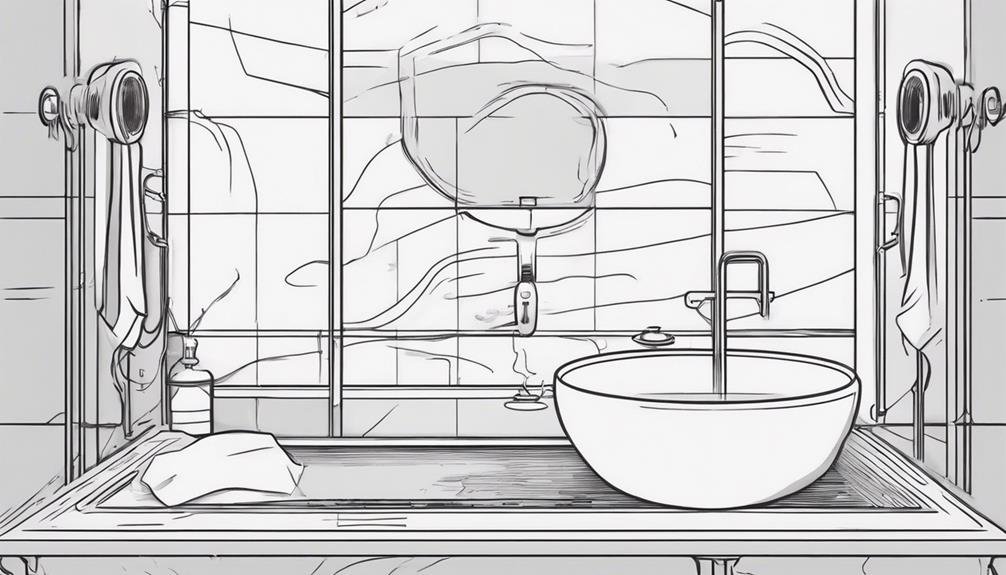If you've been hesitant to check on your septic tank because you're unsure of what signs to look for, worry no more. Slow draining fixtures, foul odors wafting through your home, unexpected lush patches in your yard, and gurgling sounds emanating from drains are all indicators that something might be amiss with your septic system.
By being aware of these warning signs, you can potentially address issues before they escalate into costly problems. Understanding these signals could save you from more significant headaches down the line, so stay tuned for crucial insights on maintaining your septic tank's health.
Key Takeaways
- Slow draining fixtures signal potential blockages or root intrusion.
- Address foul odors by checking vents, fixing leaks, and cleaning drains.
- Lush green patches indicate soil saturation from septic issues.
- Gurgling sounds suggest blockages or backups, warranting professional inspection.
Signs of Slow Draining Fixtures

If you notice water taking longer than usual to drain from sinks, showers, or toilets, it could indicate a potential issue with your septic system. Slow drainage is often a sign of underlying problems such as pipe blockages or root intrusion. Pipe blockages occur when debris or other materials obstruct the flow of wastewater through the pipes, leading to slow draining fixtures. This can happen due to a buildup of grease, soap scum, or even foreign objects that find their way into the plumbing system.
Another common cause of slow drainage is root intrusion. Tree roots are naturally attracted to the moisture and nutrients found in septic system pipes. Over time, roots can infiltrate the pipes, causing blockages and inhibiting the proper flow of wastewater. If left unchecked, root intrusion can lead to more severe issues within the septic system.
To address slow draining fixtures, it's essential to identify the root cause promptly and take appropriate action to resolve the issue before it escalates into a more significant problem. Regular maintenance and inspections can help prevent pipe blockages and root intrusion, ensuring the smooth operation of your septic system.
Foul Odors Around the House
To address foul odors around the house, conduct a thorough inspection of your septic system and household plumbing. Start by checking for any visible signs of leakage or blockages in the septic tank or pipes. Proper maintenance is essential for preventing foul odors from permeating your home. Here are three key areas to focus on:
- Inspect the Vent Pipe: Ensure that the vent pipe on your roof isn't blocked or damaged. A blocked vent can cause sewer gases to build up in your plumbing system, leading to unpleasant odors in your house.
- Check for Leaks: Examine all the connections and seals in your septic system and plumbing for any leaks. Even small leaks can release foul odors into your home. Promptly repairing these leaks is crucial for odor prevention.
- Clean the Drains: Regularly clean your drains using a mixture of baking soda, vinegar, and hot water to prevent organic matter buildup that can produce odors. Maintaining clean drains is a simple yet effective way to keep foul smells at bay.
Lush Green Patches in the Yard

Inspect your yard for lush green patches that may indicate potential issues with your septic system's drainage field. These vibrant patches can be a sign of soil saturation, where the soil is overly wet due to a possible septic system problem. The excess moisture from a malfunctioning system can lead to an accumulation of water in the drain field area, causing the soil to become saturated. This saturation can hinder the proper absorption and filtration of wastewater, resulting in the lush green appearance on the surface.
Moreover, nutrient imbalance caused by septic system issues can also contribute to the growth of lush green patches in your yard. When the septic system fails to effectively treat and distribute wastewater, it can lead to an imbalance of nutrients in the soil. This imbalance can create an environment where certain plants thrive excessively, manifesting as lush green patches in specific areas of your yard. Keep an eye out for these signs to address any potential septic tank issues promptly and prevent further damage to your system.
Gurgling Sounds From Drains
You may notice gurgling sounds coming from your drains, indicating potential issues with your septic system's drainage. These sounds can be a sign of air bubbles trying to escape through water, which could mean there's a blockage or backup in your system. To address this effectively, consider the following steps:
- Drain maintenance: Regularly clean your drains to prevent clogs that can lead to gurgling sounds. Use drain cleaners or natural solutions to keep your pipes clear of debris and buildup.
- Plumbing inspection: Schedule a professional plumbing inspection to identify any underlying issues causing the gurgling sounds. A thorough inspection can pinpoint the exact location of the problem and determine the best course of action to resolve it.
- Septic system evaluation: If the gurgling sounds persist, it may be necessary to have your septic system evaluated. A professional can assess the overall health of your system and recommend any repairs or maintenance needed to keep it running smoothly.
Conclusion
After identifying these common septic tank issues, you may think you have it all figured out. But remember, just when you think your septic system is running smoothly, that's when the real trouble may begin.
Stay vigilant and proactive in maintaining your septic tank to avoid costly and messy situations down the line.
Happy troubleshooting!

